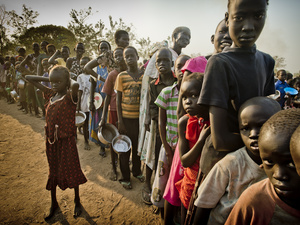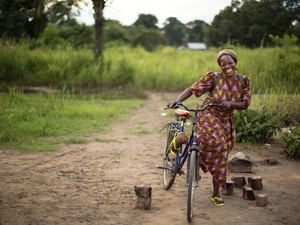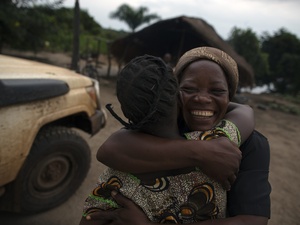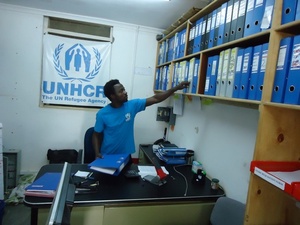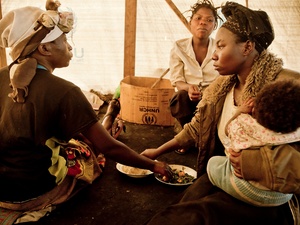From captive to tailor, teen gets a second chance
From captive to tailor, teen gets a second chance

Rose kneads dough in front of an oven at the home of Sister Angélique Namaika in Dungu. Her identity is masked for protection reasons. © UNHCR/B.Sokol
DUNGU, Democratic Republic of the Congo, September 17 (UNHCR) – It’s a peaceful morning in Dungu, in the DRC’s Orientale province. Rose*, 18, is dressed in a nice embroidered dress – a women’s day present from her husband – and giving her toddler a bath. As she moisturizes him with palm oil, the boy touches her swollen belly, a sibling on the way. This scene of family bliss would have been hard to believe until recently.
When she was 14, Rose was abducted by the Lord’s Resistance Army and spent 20 months in captivity. She was rescued by the Ugandan army in 2011 and discovered a few weeks later that she was pregnant. She had no means to survive, was rejected by her mother and was about to return to the bush. That was when she met Sister Angelique, a nun who has dedicated her life to helping women and girls who have suffered from the LRA violence.
“She was planning to go back to the bush because she was not able to reintegrate in the community,” said Sister Angelique, recalling her exchange with Rose. “I took her with me and taught her bakery and sewing.” The Sister also convinced her to keep and love the baby. Her son is now two years old.
The LRA has been active in Orientale province since 2005 and has abducted some 3,000 people, including more than 1,000 children. Boys are used as porters or forced to loot villages. Girls are forced to become the wives of the LRA soldiers, with many giving birth in captivity. While many children have been released since 2008, they say many more are still living in the bush.
Rose is among the fortunate ones. Today she is married and expecting her second child very soon. She met her husband at the market where she was cooking and selling mandazis (donuts).
“He was coming to get food from my stall and found me pretty,” said Rose in a soft and sweet voice. “He sent a neighbour to talk to me and officially proposed to my father. As my dad found that he was a reasonable man, he agreed. I was happy to build a family and to restore the honor of my name.”
Her new life is simple but happy. She wakes up at five o’clock every day, starts a fire and cooks before going to the fields or the market, where she sells mandazis and soup. She has many clients and sometimes has to cook twice a day to meet the demand.
On weekends she loves sewing. When she started taking sewing classes with Sister Angelique, her dream was to have her own sewing machine. Her dream came true and she is now considered a good tailor by other women. They often ask for her advice on how to sew dresses for special events or uniforms for the kids going to school.
“I had a lot of orders [of dresses] for Easter and the money I earned allowed me to get ready for the arrival of the baby. I bought nearly all the clothes for the baby. I just need one more set of same colour top and pants that will cost around 4,500 Congolese francs,” Rose explained with a smile on her face.
However, the trauma is not completely forgotten. She is still suffering from a sexually transmitted disease contracted in captivity, and needs constant health care.
Rose is also struggling to convince her husband to accept her young son. He does not like to pay for the boy’s expenses because he is not his own child. She shared the problem with Sister Angelique and asked for her advice.
In addition to helping the girls earn income and rebuild their lives, Sister Angelique also helps them with mediation within their families and communities. After several months of mediation last year, she convinced Rose’s mother to reunite with her daughter.
Today Rose’s life is still challenging but thanks to Sister Angelique, she is getting a second chance to build a normal life for herself and her family.
*Name changed for protection reasons
By Celine Schmitt in Dungu, Democratic Republic of the Congo


